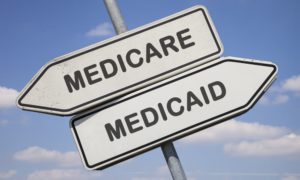Income limits for Medicaid Nursing Home Coverage

Single person — State Medicaid programs limit the income of an unmarried nursing home resident in two different ways. One way, used some state Medicaid programs, establishes a monthly income eligibility limit. This limit varies state but generally sits at about $2,313 per month. If a Medicaid applicant has income higher than the Medicaid limit in one of these states, that person isn’t eligible for Medicaid coverage of nursing home care.
Other states have no income limit but instead require the beneficiary to pay almost all income to the nursing home, with Medicaid paying the balance of the nursing home’s charges. In these states, the Medicaid program allows the resident to keep only a small amount — about $50 to $100 per month — for personal needs. Some of these states also allow a small amount of income to be retained the resident for upkeep on the resident’s home, usually only for up to one year of admission to the nursing home, and only if a physician certifies that the resident might be able to return home. Find out more about state specific income eligibility rules.
Married couple — When one spouse enters a nursing home and the other spouse (often called the “community spouse”) remains at home, Medicaid has special income rules for each.
Initial eligibility rules
For initial eligibility for coverage of nursing home care, Medicaid only considers income in the name of the person entering the nursing home. Income in the name of the community spouse is not counted at all; the community spouse can keep all income in his or her name. (This is sometimes called the “name-on-the-check” rule). The exact amount of the Medicaid applicant’s allowable income is determined the specific state’s Medicaid program, but it is usually only $350 to $750 after regular medical expenses are deducted.
Post-eligibility rules
Once a married person in a nursing home has become eligible for Medicaid coverage, new income rules kick in. The person in the nursing home can keep only a small monthly allowance for personal needs (in some states as low as $30), plus amounts necessary to pay for uncovered medical costs.
Some income that belongs to the spouse in the nursing home — meaning income in the name of the nursing home resident — can go to the community spouse if the community spouse’s own income doesn’t reach the monthly community spouse income allowance. The maximum income allowance for the community spouse in 2019 is $3,160.50, and the minimum sits at $2,057.50, but the actual number will vary from state to state. This is referred to as the Monthly Maintenance Needs Allowance (MMNA). Find out more on how the MMNA works.
In other words, if the community spouse’s own income is less than the state’s minimum income allowance, a portion of the nursing home resident’s income can go to the community spouse until the combination of incomes reaches the income limit. Any remaining income in the name of the nursing home resident goes to Medicaid, to offset the cost of the nursing home.
Contact a Medicaid nursing home coverage insurance expert
Make sure you buy insurance from a reliable company that’s licensed in your state. At HealthPro Consultants, we are a licensed Financial Marketing Organization. Our Medicaid nursing home coverage insurance experts will take care of all your nursing home care needs. Contact us now. Call us on +1 (216) 236-1466 or Text our live agent +1 (330) 443 1071. We are here to support you in all your concerns on Medicaid nursing home.
